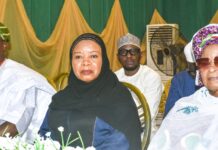
Hope is rising for the return of millions of internally displaced Nigerians to their homes and communities as the planning for the rebuilding of the North-Eastern states affected by insurgency has advanced significantly.
Last week the pre-financing assessment jointly carried out by the federal and states governments alongside the global partners: the United Nations, World Bank and the European Union was completed at a workshop in Abuja.
The global partners who had signed a tripartite agreement to facilitate the assessment are now expected to support the federal government in the financing of the NorthEast reconstruction including an offer by the World Bank to make available $800 million towards the rebuilding.
There are also clear indications from the global partners to do more in terms putting in place an institutional framework to rebuild, arranging financing even from other development agencies and additional sources.
The assessment and validation exercises completed in Nigeria’s North-East region has revealed the quantum of damage and the requirements to address the post- conflict recovery. For instance while the extent of damage was put at about $9B, the assessment revealed that over $6B would be needed for immediate and near term stabilization and recovery of the region.
During the final aspects of the assessment late last week in Abuja, international development partners and donors reiterated their commitments towards ensuring that key findings of the assessments are implemented.
This re-assurance was secured after the completion of the 2-day validation and consensus building workshop at the Transcorp Hilton Hotel in Abuja, convened by the Federal Government, World Bank, the European Union and the United Nations in conjunction with representatives of the six affected states to review findings and chart way forward.
Specifically the joint efforts of the federal and state governments with the global partners would now be directed to prioritizing the needed interventions and projects, arranging their sequence and coming up with an action plan.
For instance, the Sector Manager, Urban Development and Disaster Risk Management at the World Bank Headquarters in Washington, Mr. Idrissa Dia said the physical participation of the Bank at the validation workshop last week in Abuja is an affirmation that the global financial institution is encouraged by the initial feedbacks on the findings of the recovery and assessment.
He then reaffirmed the Bank’s commitments and support towards the overall success of the planned interventions. Mr. Dia said the World Bank is set to mobilize other bodies in the World Bank Group and partners that might be interested beyond the existing donors on the project. According to the World Bank representative at the event, “In line with the magnitude of the needs we are confronted with, we would like to also mobilize beyond the set of donors here,” he said adding that there are other big players that would be able to come into play in support of the forthcoming interventions.
On his part, the European Union’s Acting Head of Cooperation, Mr Juan Casla expressed satisfaction with the findings of the assessment saying with the leadership displayed in the process by the Federal Government, the different states and the international donor agencies, the EU is now ready to discuss the pledges it made and move forward with implementation in collaboration with other partners and the Government of Nigeria, both at the Federal and State levels.
“These findings provide shared understanding between the Government of Nigeria and its humanitarian and development partners on a set of priotized, sequenced interventions and the EU as a member of the International partnership involved in this assessment is ever- committed towards ensuring the implementation of these findings,” Casla stated.
Mr. Casla said from his experience in this type of interventions, he has seen that the team led by the Senior Special Assistant to the President on IDPs, Dr. Marian Masha has been able to put in place a thorough assessment in a complex and challenging situation in the North East.
According to the UN representative at the event, Mrs. Jean Gough, the United Nations is pleased with the successes of the assessment, harping on the readiness of the World body to provide technical and other humanitarian support towards achieving the goals of the post-assessment phase of the planning.
The RPBA findings have estimated that a sum of about $9 Billion Dollars will be required for the rehabilitation and reconstruction of damaged infrastructures in the in the six North-East States of Adamawa, Bauchi, Borno, Gombe, Taraba and Yobe.
The findings also revealed that the six states would need $6.4 billion to undertake recovery efforts to cushion the devastation inflicted on the North-East Region between 2011 and 2015.
The assessments were carried out under the three main components of Infrastructure and Social Services, Peace Building, Stability & Social Cohesion, and Economic Recovery with focus on cross-cutting issues such as governance and accountability, citizen engagement, institutional capacity for implementation, gender, youth, human rights and de-mining.
Dr Mariam Masha had disclosed that Borno state was worse hit by the crisis with a loss of $6 billion. According to her, the region suffered damages worth $3 billion in housing alone while it also suffered damages in terms of livestock which brought about the need to restore agriculture in the region.
According to her “what this process brings home is that it helps to create a platform to harmonise resources, to coordinate better, support and planning at the federal and state levels, and support also from international donors and partners.”
The RPBA findings also revealed that Yobe and Adamawa states were next in devastation, adding that the destruction in other parts of the region is enormous but with less gravity.
Dr. Masha added that no fewer than 20,000 lives were lost while 1.8 million people were displaced by the Boko Haram insurgency and the planned interventions are to be implemented over time, in view of resources that are available for its implementation.
“Crisis recovery in the North-East is a priority of the Nigerian Government and this has been demonstrated by the ownership and leadership of the recovery assessment process, it has helped in securing the continued support of the partners, donors and other critical stakeholders. The plan and implementation strategy are critical to the success of the recovery efforts. It is not so much about the amount of financial resources that are available, but how we are able to utilize the resources and the capacity to put them to use”, Dr. Masha remarked.
The Three–volume report of the Nigeria Recovery and Peace Building Assessment (RPBA) recommended a 2-phase strategic plan of two years for stabilization and a recovery phase of 2 years to restore the North-East to progress and development. The two phases of stabilization and recovery are fluid and will run concurrently, covering such areas as agriculture, housing, transportation and education over the period.
The Nigeria Recovery and Peace Building Assessment (RPBA) is the process that assesses the physical, social and economic impacts of the crisis in the North-East, resulting in a report to guide the process of stabilization in the region through a variety of recovery strategies.
These strategies will help reduce suffering in affected communities, restore a sense of normalcy and regain the trust of people in the region.
It would be recalled that the Federal Government had in January unveiled this assessment programme which is a joint, high-level collaboration between the Government of Nigeria and three global development partners – the World Bank, EU and the UN – aimed at supporting Government in its short and medium term efforts towards peace building and sustainable recovery in the North-East region of the country.




